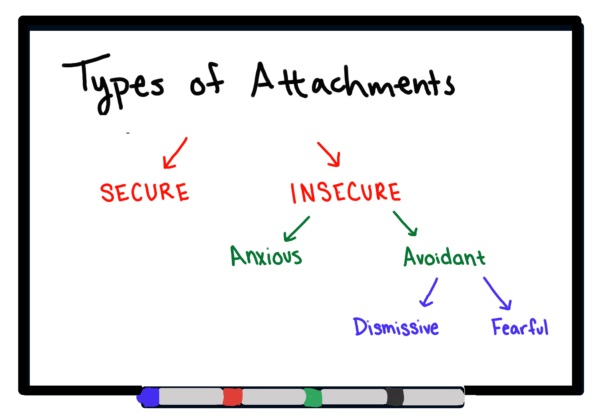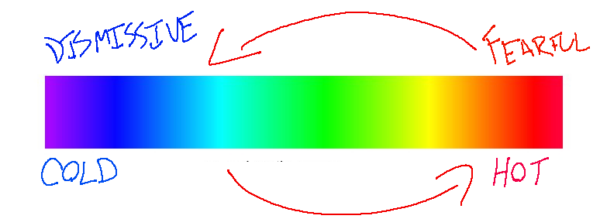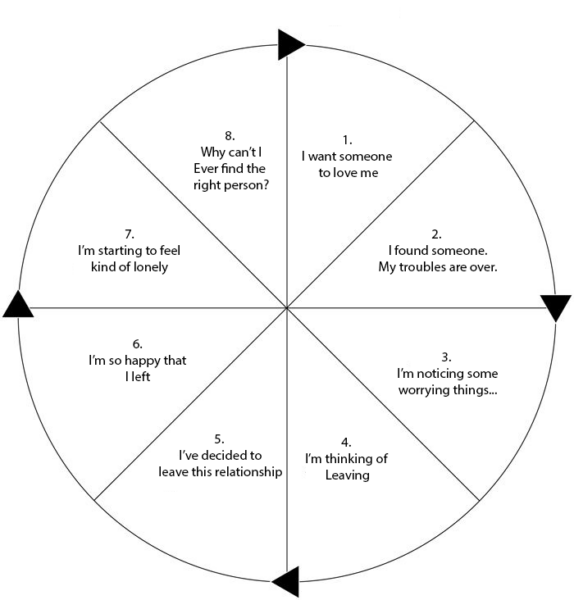Today we’re going to have an in-depth discussion on why avoidant exes act hot and cold.
Ultimately you’re going to learn,
- Your Avoidant Ex Is Probably A Fearful Avoidant
- The Avoidant Paradox
- The Fearful Avoidant Self Fulfilling Cycle
- Why They Confuse Neglect With Independence
So, if you’re ready to go all in on learning about avoidants and their mixed signals this is the guide for you.
Let’s get started.

What Are Your Chances of Getting Your Ex Boyfriend Back?
Take the quizHot And Cold Avoidants Are Most Likely Fearful Avoidants
Take a moment and look at this graphic,
This is essentially the ultimate breakdown of how attachment styles are classified.
Notice how there are really two types of avoidant attachment styles.
- Dismissive
- Fearful
I’m going to make the argument that if your ex is giving you mixed signals, they are hot one moment and cold the next then they probably fall on the fearful avoidant spectrum.
Take a look at the major signs of a dismissive avoidant,
- Tends to block out relationships when they become too vulnerable
- Shuts down completely when something triggers them
- Has a bit of an ego and usually judges others
- Big into self sufficiency and independence.
- Usually will choose their career over you
Compare that to the fearful avoidant,
- Enjoys intimate relationships more than their dismissive counterpart
- Can experience high bouts of anxiety in the relationship
- Can fear that you’ll leave them
- Wants to rely on others but feels distrustful of them
My argument is simple. Exes who are dismissive avoidants will fall into the ghosting category. Usually this means they’ll choose to block you as opposed to entertaining the idea of talking to you post breakup. This doesn’t mean you’ll be blocked forever. Remember, all avoidants fall victim to that nostalgic reverie component I often talk about but the fearful avoidant is a lot more likely to swing between the extremes.
Think of it like this, there’s a spectrum,
Dismissive avoidants are a lot more likely to veer in the cold direction on the scale while fearful avoidants are a lot more likely to exhibit “hot” types of behaviors but the really interesting thing about them is that you’ll notice they flip flop back and forth.
Why?
Well, it has something to do with a paradox that lies at the heart of every avoidant.
Understanding The Avoidant Paradox
One of the biggest misunderstandings that people have about avoidants is that most think they aren’t looking for love but that’s actually not the case.
In fact, most avoidants I’ve met want love more than anyone else. It’s just that they don’t want to let anyone close enough to give that love to them.
And here is the ultimate contradiction that most people deal with when they date an avoidant.
Things seem great at first but over time as the avoidant begins to get triggered their need of self security wins out over vulnerability.

What Are Your Chances of Getting Your Ex Boyfriend Back?
Take the quizWhat I find interesting about attachment theory in general is that it’s rooted in our childhood. So, when you look at someone who has avoidant traits those avoidant traits are in part to how their primary caregivers raised them.
Generally they find with avoidants that the primary caregiver did a great job of providing basic necessities, food, shelter, etc. However, they weren’t so great at providing emotional support. As a result, children learn to self soothe and come up with coping mechanisms.
Now, fast forward twenty some odd years and look at relationships. You start dating an avoidant and notice they are pulling away when emotional intimacy is required. They aren’t doing this because they don’t want to receive love. They’re doing it because they have 20 years of experience doing that kind of thing. It’s embedded into their psyche from childhood.
The result is often a self fulfilling pattern that exhibits itself in relationships.
The Fearful Avoidant Self Fulfilling Cycle
Again, I’m going to hit you with one of my handy dandy graphics here,
This is often the relationship cycle most fearful avoidants find themselves in. Believe it or not I came up with this graphic after studying our clients on again/off again relationships.
So, what’s interesting about this is how it’s laced with both anxious and avoidant characteristics (which is common for fearful avoidants.)
Again, take a look at this,
Your exes anxious side potentially leads them to looking for love. After all, there’s nothing an anxious attachment style fears more than abandonment and this inherent belief contradicts what an avoidant is all about but more on that later.
So, basically after that anxious side wins out they meet you and things are great. In fact, you may find that at the beginning of a relationship a fearful avoidant is very anxious to the point where they’re needing constant validation. This moment of constant validation serves as a grounding point for your overall opinion of them.
“Wow, they’re really insecure” you might think to yourself.
But eventually an odd thing begins to happen. As you exhibit behaviors in the relationship that begin to trigger them their avoidant side takes the wheel.
All of a sudden they start becoming distant or uninterested. Often they will appear complacent. Now, any normal person in this circumstance will push the fearful avoidant for a solution.
Side Note: Believe it or not but your attachment style matters greatly because usually that will dictate what reaction the fearful avoidant will give. For example, if you have an avoidant side then in the relationship your ex would have probably acted very anxious. Of course, the opposite is also true. If you had a dominant anxious attachment style then their avoidant side gets triggered.
Ultimately the more you dig in the worse it gets until finally your ex breaks things off. They’ll have a sense of relief and euphoria. Their survival mode won out. Of course, they’re fearful avoidant so as they avoid you their anxious side gets triggered. They’ll develop a victim mentality and wonder why they can’t ever find anyone. A common thing we hear exes say is,
“Why is this always happening to me.”
I want to shake them and say, BEACUSE YOU’RE SABOTAGING YOUR RELATIONSHIPS.
Nevertheless, the anxious side takes back over.
You want to know why your avoidant ex is hot and cold? The answer is ultimately that their entire existence is one of hot and cold behaviors. It develops out of a misunderstanding of silence.
Why The Avoidant Confuses Neglect With Independence
From an early age the avoidant had to learn to become independent. They learned how to self soothe and create coping mechanisms and perhaps the most odd thing about it is that they aren’t aware they are doing this. In fact, they have some pretty great rationalizations.

What Are Your Chances of Getting Your Ex Boyfriend Back?
Take the quizLet’s use a common example to illustrate this point.
At six years old little Timmy’s parents told him that he was old enough now to sleep on his own. He’s six after all. He’s proud of this fact. His parents view his a mature individual capable of figuring out how to fall asleep on his own. What Timmy doesn’t realize is that potentially his parents are robbing him of an opportunity for intimacy.
Now, I’m not here to blame an avoidants parents. Many times they are avoidants themselves or unaware of the affect they are having on someone like Timmy but as time goes on a very curious thing happens to Timmy.
At 25 years old Timmy has met the love of his life, you. There’s just one thing that always bugs him about your relationship. You insist on sharing a bed time ritual. “Why aren’t you mature enough to do this yourself?” Timmy will internalize this fact and ultimately use it to self sabotage the relationship.
Avoidants also inherently think they are better than you.
Using Timmy again,
The fact that you need to share a bed time ritual with him is something he’ll view as a sign of weakness. He’ll think he’s better than you because he doesn’t need to do that.
Personally, I think Free To Attach sums it up best,
Secretly they can feel above their partners because of their sense a partner (or ex) ‘needs’ them more – not able to understand that this vulnerability is in fact the braver and more natural position, and that it is in fact the avoidant who was forced to unhealthily suppress their natural attachment needs to feel safe.
It’s important not to be too hard on the avoidant though.
The truth is that they don’t really know any other way of living. They’ve been using neglect as a swap for independence for most of their lives.





Myles
September 11, 2024 at 11:23 pm
Hi, I just met a woman online and we talked over the phone for around 20 days. We shared a lot and were pretty close and would talk for hours everyday . We planned on meeting in person, she was about to fly from Minnesota to Seattle where I live. An hour before the flight she said her step dad had an accident and then basically disappeared. I obviously chased her with texts ( I know now that’s not good). A few days after she responds to my messages and accuses me of being impatient then she promises me to communicate more about her feelings. A week after I fly to see her and her 7 years old daughter. She introduces me to her daughter as a friend. We spend a whole day me, her and her daughter and she was very happy and sends me a message that she enjoyed the whole day and can’t wait for visiting sights the next morning. She then disappears and not respond to any texts. I leave early back to Seattle and eventually after sending her multiple messages she responds 4 days after and tells me she is busy with classes that what’s why she disappeared and that she needs to focus on things for a week or two. She tells she is just too busy to talk about this. I told her I’m committed and will give her space for a week or so until she feels better. She agrees. Should I check in with her in a few days? What type of personality is this?
Anna Henning
March 28, 2023 at 1:16 am
Ugh. The more I read about and try to understand my avoidant ex, the less I want to do with them. They need to put on their big person pants and do the work. All these articles make excuses for them and tell their partners how to so circus tricks around them in order to not trigger their avoidance. Don’t get me wrong- I have empathy for what brought them to this point. But at some point we are all responsible for growing, changing, and being our best selves, especially if we want good relationships. I have no desire to parent my partner or do backbends to get crumbs from them. Thank you for the education, it helps.
Sarah
February 22, 2022 at 7:19 pm
Thanks for the post and insights! My fearful-avoidant ex is consistently trying to reach out to my family- should I take this as a sign that it’s time for me to reach out, or wait for him to contact me directly?
EBR Team Member: Shaunna
March 1, 2022 at 9:53 pm
Hey Sarah, I would suggest that you be sure that you complete a 30 day NC before you reach out regardless of how many times he reaches out to your family.